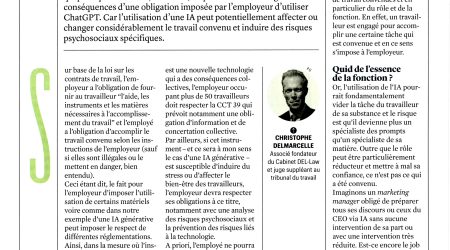Can strikers block warehouses? (Trends 30-9-2021)
Posted the 11 December 2021While the right to strike is recognized under international standards, particularly Article 6.4 of the European Social Charter, it does not have direct legal recognition in Belgium. However, this right can be indirectly inferred from the 1948 Law on Services of Public Interest.
A strike is generally defined as "the collective and concerted abstention by a group of employees from performing their work, with the immediate aim of halting the operations of one or more companies to exert pressure either on employers or on a third party."
The question of whether picket lines blocking site access or even site occupation are intrinsic to the right to strike is highly debated.
Case law—under the influence of the European Social Charter—is increasingly accepting strike pickets as an extension or accessory to the right to strike, giving it effectiveness as an action to encourage strikers or dissuade non-strikers.
However, according to the theory of separable acts, such actions may be prohibited by a judge—in summary proceedings—if they infringe on property rights (when the picket de facto takes control of the company or prevents free access to the company or goods), the rights of third parties such as the right to work of non-striking workers (who would be denied access), the right to conduct business of co-contractors unable to execute commercial contracts, or the right to free movement of people in the case of road blockades.
This would presumably apply here.
Such summary proceedings can be initiated:
(i) Contradictorily (the opposing party is heard); or
(ii) Unilaterally (the opposing party is not heard, and the procedure is very rapid) if proof of absolute necessity is provided (e.g., in cases where it is impossible to identify the perpetrators of an act of trespass). The latter option is obviously the most effective due to its speed and the element of surprise.
The order prohibiting the trespass is served by a bailiff (with a formal warning), who can seek assistance from law enforcement. The order may also be accompanied by a daily penalty.
It should also be noted that the strike itself may be illegal/unlawful if procedural requirements are not met or if it is abusive and unreasonable.
In certain cases, participants could be dismissed for serious misconduct, face disciplinary sanctions, or lose their unemployment benefits.
Employers are advised to act quickly to prevent the conflict from escalating, particularly to avoid violence or damage—which is absolutely unacceptable—through legal means or open dialogue, including clear communication about intentions and the social plan, ideally quantified as early as possible.
Trends, 30-9-2021
Related articles

Is an employer allowed to mandate the use of artificial intelligence tools by employees ? (Trends, 17-07-2025)

Caution if a former colleague opposed to your employer asks you to testify in their favor
